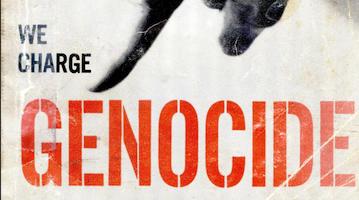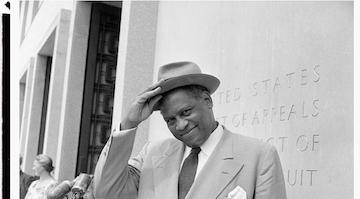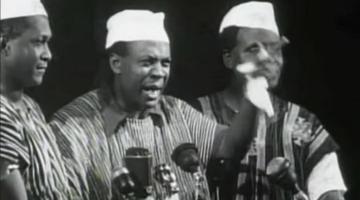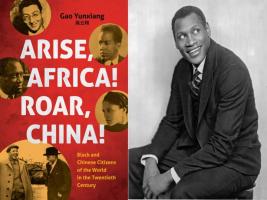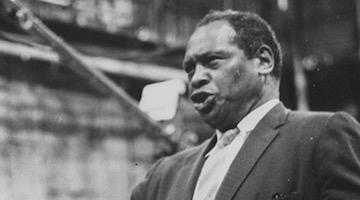“The Indian people cherish Robeson’s example of revolutionary humanity at its most developed and saluted him as their black brother in struggle.”
On June 27, 1938, a large crowd of supporters welcomed Jawaharlal Nehru, the future Prime Minister of independent India, and Paul Robeson, African-American artist, leader, and freedom-fighter, at London’s Kingsway Hall. Rajani Palme Dutt, an Indo-Swede who served as the foremost journalist and theoretician of the Communist Party of Great Britain delivered the opening address. In just two short years, Nehru had raised the membership of the Indian National Congress from half a million to over three million. In his remarks, Dutt (who would tragically criticize Gandhi’s civil disobedience strategy in 1922 and defend Trotsky in 1926) seems to have had a change of direction, to some extent: at the 1938 India League meeting, he congratulates Nehru’s capacity to reach and retain the commitment of the Indian masses to the broad movement for national independence. In his address to the crowd, Robeson emphasized the necessity of uniting the democratic and progressive forces throughout the world against imperialism. He noted that the African-American people, who were seeking political and economic freedom in Jim Crow America, were closely watching “the Indian struggle and have been conscious of its importance to us.”
“Robeson emphasized the necessity of uniting the democratic and progressive forces throughout the world against imperialism.”
As Martin Duberman writes in his biography of Robeson, during their stay in London, Paul and Eslanda Robeson met frequently with Nehru. In fact, there is some evidence in the history of the exchanges between Eslanda and Nehru of a possible romantic involvement between the two. Essie, Nehru writes, “would dash in occasionally into my flat and announce in the American way, that she was feeling like a million dollars. I am sure she has that capacity of feeling that way whatever happens.” Eslanda would herself remark that she thought Nehru rather dashing. After a luncheon with Nehru following the India League rally at Kingsway Hall, Essie presented Nehru with her biography of her husband, Paul Robeson, Negro. She would also become a good friend to Vijaya Laxmi Pandit, Nehru’s sister, with whom she corresponded throughout her life. Vijaya Laxmi had accompanied Nehru to England in 1938.
Earlier that month, Robeson would act in A Plant in the Sun, a political play about young workers in the shipping department of a sweet factory in New York organizing to stage a sit-in when a co-worker named Peewee–played by Paul Robeson–is fired for expressing pro-union sentiments. Nehru, Vijaya Laxmi, and Krishna Menon, the Secretary of the India League, were all present in the audience.
“The African-American people were closely watching the Indian struggle and have been conscious of its importance to us.”
The play’s plot-line underscores the importance of political solidarity across race as well as class lines. As Henry Winston, the Du Boisian-Leninist leader of the American Communist Party, beloved by his people as “Winnie,” emphasizes, “There are no substitutes for the class unity of the working class as a whole. This requires the equality of joint Black and white leadership of the Black liberation movement and all components of the working class leading all the oppressed and exploited against corporate monopoly.” Winston’s words remind us that the preservation of unity is key to the sustenance of any broad liberation strategy for genuine world peace–a peace rooted in the freedom of all those oppressed by neoliberalism and Western civilization, a peace opposed to the specious Pax Americana that impedes our present struggle for freedom.
The intimacy of relations between the leadership of the African-American and Indian people’s independence movements is not coincidental. As I have previously suggested, after Du Bois, we must think of the unity of Pan-Africa and Pan-Asia when considering the movement of human history in the past two thousand years. Such an approach is vital to the defense of our common future, which must begin, first and foremost, with the liberation of the dark proletariat in unity and struggle with–but not subservient to–the white proletariat, which, in turn, must, as Winston emphasizes, join in sincere dialogue and empathy with the Black workers of the world in order the identify their common oppressor.
“We must think of the unity of Pan-Africa and Pan-Asia when considering the movement of human history in the past two thousand years.”
“Our Black Brother, Paul Robeson” is a folk song quilled by Bengali singer and composer Hemanga Biswas (1912-1987), a freedom-fighter, and man of the people. I am not entirely certain of the date when it was written, but I’d guess sometime in the late 40s, though I could be mistaken. Biswas was born in British Assam, in a region that is now Bangladesh. In college, Biswas embraced the principles of communism and composed a variety of plays and poetic pieces on questions pertaining to truth, equality, and justice. He began arranging “Gana Sangeet”–anthems dedicated to the liberation of his beloved India from the bitter yoke of British oppression.
Paul Robeson is the reigning muse of this sangeet, whose lyrics I include below in Bengali and English. The Indian people cherish Robeson’s example of revolutionary humanity at its most developed and salute him as their black brother in struggle–“Negro bhai aamar Paul Robeson” They don’t allow us to raise our voices, Robeson,” they plead to him accusingly, pointing to their British oppressor. The recurring refrain invoking Robeson as a moral anchor in the song, as witness in the scene of the crime, ought to remind us of the gravity of Robeson’s moral authority in matters concerning Black racial progress in the world labor movement. He was beloved by the Indian workers, who saw, like Nehru and Vijaya Laxmi, in Britain, that their destinies were bound up in each other’s, so much so that a young Bengali college student was compelled to compose an anthem in his name. The song continues to remain a popular folk song on the subcontinent. Robeson is repeatedly called upon to bear witness to the suffering of the Indian masses.
“Robeson was beloved by the Indian workers.”
The people of the Indian subcontinent are a musical people. Thus, they are not a people capable of tolerating silence for very long and so, they are socially prone to raising their voices in song at various intervals of daily life. Music, moreover, sustains human work throughout the world, having accompanied it for millennia, with the African-American spiritual and labor songs bequeathed to us by Robeson being some of the most beautiful examples of songs wrought in love and struggle. So we can see why in “Our Black Brother Paul Robeson,” Biswas’s chorus of workers, from whose perspective the song is imagined, summon Robeson to the scene of labor itself in order to draw attention to how the raised voices of the people in unity pose a threat to the ever-encroaching master who diligently oversees their work.
“Ora Aamader Gaan Gaite Deyna” or “Our Black Brother Paul Robeson”
Bengali
ORA AAMADER GAAN GAITE DEYNA NEGRO BHAI AAMAR PAUL ROBESONAAMRA AMADER GAAN GAI
ORA CHAY NA ORA CHAY NA
NEGRO BHAI AAMAR PAUL ROBESON
ORA BHOY PEYECHHE ROBESON
AAMADER KUCHKAOAJE BHOY PEYECHHE
AAMADER ROKTO CHOKH KE BHOY PEYECHHE
HIMMOTER SHOKTI KE BHOY PEYECHHE ROBESON
NEGRO BHAI AAMAR PAUL ROBESON.
ORA BHOY PEYECHHE JIBONE
ORA BHOY PEYECHHE MORONE
ORA BHOY KORE SEI SMRITI KE
ORA BHOY PEYECHHE DU: SWOPONE.
ORA BHOY PEYECHHE ROBESON.
English Translation
They don’t allow us to raise our voice.
My black brother Paul Robeson.
We sing in our raised voice.
They don’t like, they don’t like
My black brother Paul Robeson.
They’re fear-struck Robeson.
They’re fear-struck as they hear our war cry.
They’re fear-struck as they see our red eye.
They’re fear-struck as they feel our vigor of bravery, Robeson.
My black brother Paul Robeson.
They are afraid of living.
They are afraid of dying.
They are afraid of remembering.
They are afraid of dreaming.
They are afraid Robeson.
Listen here
“Ora Aamader Gaan Gaite Deyna” or “Our Black Brother Paul Robeson”
https://m.youtube.com/watch?v=rMqE6U7BhxM
“Ora Aamader Gaan Gaite Deyna” or “Our Black Brother Paul Robeson”
R. Divya Nair is an artist, writer, editor, and educator who is currently completing her doctorate in literary studies. She organizes with The Saturday Free School in Philadelphia, which is currently leading a year-long, city-wide campaign to read W.E.B Du Bois’s works and return to his political practice with fresh eyes.
This article previously appeared in Minervas’s Perch .

